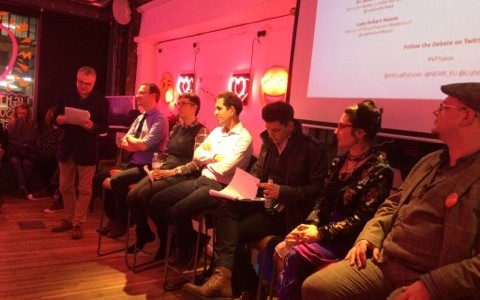Brain hackers, brain professors, brain artists, the human brain project, a brain curious audience and me.
We were all there for the Virtual Futures Salon about NeuroStimulation.
It was my first ‘gig’ as the Author in Residence and I have to say I thoroughly enjoyed it. The venue was a bar in Soho, London and the place was buzzing with conversation, debate and towards the end with electricity being zapped through some willing brains.
My story, written especially for the evening, is set in a call centre of the future and based on the notion that NeuroStimulation has become the everyday way of boosting your brain.
Check out the event and read my story – Everyday Stims – on the Virtual Futures’ website.
Boost the brain with a quick zap. Is this the future of the workplace? #SciFi #FlashFiction Share on X



